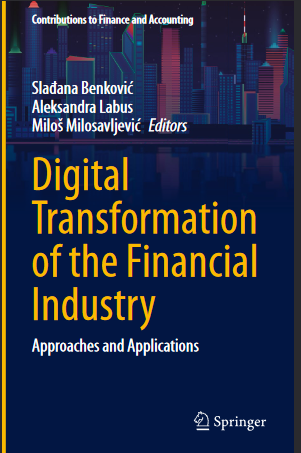Abstract Enterprise Resource Planning (ERP) is one of the popular information communication technologies (ICT) in the contemporary business environment, adopted by many companies around the world. It is usually considered that ERP allows rapid information flow, minimal response time to the requirements of buyers and suppliers, better interactions with business partners, higher quality of services, and increased customer satisfaction. It is also often found that ERP influences accounting information systems (AISs), the application of different accounting methodologies, and the accounting profession. We, therefore, aim at identifying the effects of ERP implementation on the AIS and accounting professionals. We use a questionnaire to investigate the attitudes of 37 persons working in accounting and related departments of 37 companies operating in Serbia. Our results show that accountants believe that ERP implementation strongly influences data processing and recording, as well as preparing and publishing financial reports. They believe that ERP increases accountants’ efficiency and work performance, although the level of accountants’ satisfaction with ERP is relatively weak. Our results also show that accountants do not find it difficult to adapt to the new working conditions in the ERP environment. Keywords Accounting information · ERP systems · Accountants’ work · Accountants’ satisfaction · Accountants’ performance 1 Introduction Digitalization and digital transformation are our reality, permeating all spheres of life and business. Accounting information systems (AISs) and accounting professionals are not immune to these processes. Blockchain and big data analytics, supported by M. Todorović · M. Čupić (✉) Faculty of Economics, University of Kragujevac, Kragujevac, Serbia e-mail: mtodorovic@kg.ac.rs; mcupic@kg.ac.rs © The Author(s), under exclusive license to Springer Nature Switzerland AG 2023 S. Benković et al. (eds.), Digital Transformation of the Financial Industry, Contributions to Finance and Accounting, https://doi.org/10.1007/978-3-031-23269-5_1 2 M. Todorović and M. Čupić cloud-based analytical tools and artificial intelligence (AI) automate decision- making, release accountants from routine tasks, and reduce the risk of human errors, but on the downside also increase the cybersecurity risks (Gonçalves et al. 2022). Consequently, digitalization is attracting the attention of researchers trying to ana- lyze and explain the challenges that technologies bring and thus contribute to the realization of the goals and tasks of the accounting professionals (Knudsen 2020; Möller et al. 2020; Lombardi and Secundo 2021; Agostino et al. 2022). This is not an easy task given the dynamics of changes, expectations from the accounting profes- sion, and the complexity of the issue. The focus of these researchers is often on the effects of Enterprise Resource Planning (ERP) implementation (Grabski et al. 2011; Kanellou and Spathis 2013; Heinzelmann 2017; Youssef and Mahama 2021). Youssef and Mahama (2021) point out that the ERP is software for corporate resource planning consisting of “a single database that integrates a software suite to streamline business processes and facilitate data and information flow between a firm’s business processes and its trading partners.” They further stress that ERP is considered to “provide an integrated solution for planning, executing and controlling business processes horizontally across the value chain.” ERP was developed as an answer to the continuously growing information needs of management (Bradford and Florin 2003; Malinić and Todorović 2012) and is often observed as a factor of the company’s competitive advantage (Tarigan et al. 2020). ERP implementation is also associated with organizational changes, process reengineering, and changes in the functions of employees (Martins and Santos 2021). ERP is often found to influence the organization and performance of AIS, the application of different accounting methodologies, and the accounting profession. The most important effects of ERP implementation on AIS are better quality of reports, stronger organizational integration, and empowered personnel (Abbasi et al. 2014; Zamani and Valmohammadi 2014). ERP implementation allows the applica- tion of various advanced accounting techniques and tools (Malinić and Todorović 2012; Todоrović 2014, 2016) and accounting techniques used with ERP can affect company performance (Wajdi 2018). ERP also changes the way accountants work and seek new knowledge (Martins and Santos 2021). We, therefore, aim at identi- fying the effects of ERP implementation on the AIS and accounting professionals of Serbian companies. More specifically, we aim to answer the following research questions: RQ1. What changes does ERP bring to AIS? RQ2. How does ERP affect the efficiency, motivation, and satisfaction of accounting professionals? By addressing our research questions, we address several research gaps and thus make several contributions to the extant literature. Gonçalves et al. (2022) argue that “the impact of digital transformation on accounting is still very unclear.” Our research, therefore, contributes to the dissemination and further development of knowledge on modern trends in AIS and to a better understanding of the changes to the role of professionals in accounting, management accounting, controlling, and financial management in companies adopting and implementing digital Effects of ERP on Accounting Information System: Analysis of Accountants’. . . 3 technologies. Youssef and Mahama (2021) similarly note that “the extant literature has offered inconclusive evidence on the impact of ERP on management accounting practices.” Consequently, our research contributes to the literature on the impact of ERP on AIS and accountants, which is also important given the relatively scarce literature on this topic, especially in developing and emerging economies. The structure of the paper is as follows. The second part provides the theoretical background, while the third provides a review of the previous research. The fourth part presents the methodology. The fifth part presents the results and discussion of our results, while the sixth part presents our conclusions
چکیده فارسی
چکیده برنامه ریزی منابع سازمانی (ERP) یکی از فن آوری های ارتباطات اطلاعاتی محبوب (ICT) در محیط کسب و کار معاصر است که توسط بسیاری از شرکت ها در سراسر جهان پذیرفته شده است. معمولا در نظر گرفته می شود که ERP جریان اطلاعات سریع، حداقل زمان پاسخگویی به نیازهای خریداران و تامین کنندگان، تعامل بهتر با شرکای تجاری، کیفیت بالاتر خدمات و افزایش رضایت مشتری را امکان پذیر می کند. همچنین اغلب مشاهده می شود که ERP بر سیستم های اطلاعات حسابداری (AIS)، کاربرد روش های مختلف حسابداری و حرفه حسابداری تأثیر می گذارد. بنابراین، هدف ما شناسایی اثرات اجرای ERP بر AIS و متخصصان حسابداری است. ما از یک پرسشنامه برای بررسی نگرشهای 37 نفر که در بخش حسابداری و بخشهای مرتبط 37 شرکت فعال در صربستان کار میکنند، استفاده میکنیم. نتایج ما نشان می دهد که حسابداران بر این باورند که پیاده سازی ERP به شدت بر پردازش و ثبت داده ها و همچنین تهیه و انتشار گزارش های مالی تأثیر می گذارد. آنها معتقدند ERP کارایی و عملکرد کاری حسابداران را افزایش می دهد، اگرچه سطح رضایت حسابداران از ERP نسبتا ضعیف است. نتایج ما همچنین نشان می دهد که حسابداران برای سازگاری با شرایط کاری جدید در محیط ERP مشکلی ندارند. کلمات کلیدی اطلاعات حسابداری · سیستم های ERP · کار حسابداران · رضایت حسابداران · عملکرد حسابداران 1 مقدمه دیجیتالی شدن و تحول دیجیتال واقعیت ما است که در همه حوزه های زندگی و تجارت نفوذ می کند. سیستم های اطلاعات حسابداری (AIS) و متخصصان حسابداری از این فرآیندها مصون نیستند. بلاک چین و تجزیه و تحلیل داده های بزرگ، پشتیبانی شده توسط M. Todorović · M. Čupić (✉) دانشکده اقتصاد، دانشگاه Kragujevac، Kragujevac، صربستان ایمیل: mtodorovic@kg.ac.rs; mcupic@kg.ac.rs © نویسنده(ها)، تحت مجوز انحصاری Springer Nature Switzerland AG 2023 S. Benković و همکاران. (ویرایشگران)، تحول دیجیتالی صنعت مالی، مشارکت در امور مالی و حسابداری، https://doi.org/10.1007/978-3-031-23269-5_1 2 M. Todorović و M. Čupić ابزارهای تحلیلی مبتنی بر ابر و هوش مصنوعی (AI) تصمیمگیری را خودکار میکند، حسابداران را از وظایف معمول رها میکند و خطر خطاهای انسانی را کاهش میدهد، اما از جنبه منفی نیز خطرات امنیت سایبری را افزایش میدهد (Gonçalves و همکاران 2022). در نتیجه، دیجیتالیسازی توجه محققانی را به خود جلب میکند که تلاش میکنند چالشهایی را که فناوریها به همراه دارند، تحلیل و توضیح دهند و در نتیجه به تحقق اهداف و وظایف متخصصان حسابداری کمک کنند (Knudsen 2020; Möller et al. 2020; Lombardi and Secundo 2021). ؛ آگوستینو و همکاران 2022). با توجه به پویایی تغییرات، انتظارات از حرفه حسابداری و پیچیدگی موضوع، این کار آسانی نیست. تمرکز این محققان اغلب بر روی اثرات اجرای برنامه ریزی منابع سازمانی (ERP) است (گرابسکی و همکاران 2011؛ کانلو و اسپاتیس 2013؛ هاینزلمن 2017؛ یوسف و ماهاما 2021). یوسف و ماهاما (2021) اشاره می کنند که ERP نرم افزاری برای برنامه ریزی منابع شرکتی است که از یک پایگاه داده واحد تشکیل شده است که مجموعه نرم افزاری را برای ساده کردن فرآیندهای تجاری و تسهیل جریان داده و اطلاعات بین فرآیندهای تجاری شرکت و شرکای تجاری آن یکپارچه می کند. آنها همچنین تاکید می کنند که ERP به عنوان "راه حلی یکپارچه برای برنامه ریزی، اجرا و کنترل فرآیندهای تجاری به صورت افقی در سراسر زنجیره ارزش ارائه می کند." ERP به عنوان پاسخی به نیازهای اطلاعاتی در حال رشد مدیریت توسعه یافته است (برادفورد و فلورین 2003؛ مالینیچ و تودوروویچ 2012) و اغلب به عنوان یک عامل مزیت رقابتی شرکت مشاهده می شود (تاریگان و همکاران 2020). پیاده سازی ERP همچنین با تغییرات سازمانی، مهندسی مجدد فرآیند و تغییرات در عملکرد کارکنان همراه است (مارتینز و سانتوس 2021). ERP اغلب بر سازماندهی و عملکرد AIS، کاربرد روشهای مختلف حسابداری و حرفه حسابداری تأثیر میگذارد. مهمترین اثرات پیاده سازی ERP بر AIS کیفیت بهتر گزارش ها، یکپارچگی سازمانی قوی تر و پرسنل توانمندتر است (عباسی و همکاران 2014؛ زمانی و والمحمدی 2014). پیاده سازی ERP امکان استفاده از تکنیک ها و ابزارهای مختلف حسابداری پیشرفته را می دهد (Malinić and Todorović 2012; Todоrović 2014, 2016) و تکنیک های حسابداری مورد استفاده با ERP می توانند بر عملکرد شرکت تأثیر بگذارند (Wajdi 2018). ERP همچنین نحوه کار حسابداران و جستجوی دانش جدید را تغییر می دهد (مارتینز و سانتوس 2021). بنابراین، هدف ما شناسایی اثرات پیاده سازی ERP بر AIS و متخصصان حسابداری شرکت های صرب است. به طور خاص، هدف ما پاسخ به سؤالات تحقیق زیر است: RQ1. ERP چه تغییراتی در AIS ایجاد می کند؟ RQ2. ERP چگونه بر کارایی، انگیزه و رضایت متخصصان حسابداری تأثیر می گذارد؟ با پرداختن به سؤالات پژوهشی خود، به چندین شکاف پژوهشی می پردازیم و در نتیجه به ادبیات موجود کمک می کنیم. گونچالوس و همکاران (2022) استدلال می کنند که "تاثیر تحول دیجیتال بر حسابداری هنوز بسیار نامشخص است." بنابراین، تحقیقات ما به انتشار و توسعه بیشتر دانش در مورد روندهای مدرن در AIS و درک بهتر تغییرات در نقش متخصصان در حسابداری، حسابداری مدیریت، کنترل و مدیریت مالی در شرکتهایی که اثرات دیجیتال را اتخاذ و اجرا میکنند، کمک میکند. ERP در سیستم اطلاعات حسابداری: تجزیه و تحلیل حسابداران. . . 3 تکنولوژی یوسف و ماهاما (2021) به طور مشابه خاطرنشان می کنند که "متون موجود شواهد غیرقطعی در مورد تأثیر ERP بر روی شیوه های حسابداری مدیریت ارائه کرده است." در نتیجه، تحقیقات ما به ادبیات مربوط به تأثیر ERP بر AIS و حسابداران کمک می کند، که با توجه به ادبیات نسبتاً کمیاب در مورد این موضوع، به ویژه در اقتصادهای در حال توسعه و نوظهور، مهم است. ساختار مقاله به شرح زیر است. بخش دوم پیشینه نظری را ارائه می دهد، در حالی که بخش سوم مروری بر تحقیقات قبلی ارائه می دهد. بخش چهارم روش شناسی را ارائه می کند. بخش پنجم نتایج و بحث در مورد نتایج ما را ارائه می دهد، در حالی که قسمت ششم نتیجه گیری ما را ارائه می دهد
ادامه ...
بستن ...
Editors
Slađana Benković
Faculty of Organizational Sciences
University of Belgrade
Belgrade, Serbia
Aleksandra Labus
Faculty of Organizational Sciences
University of Belgrade
Belgrade, Serbia
Miloš Milosavljević
Faculty of Organizational Sciences
University of Belgrade
Belgrade, Serbia
ISSN 2730-6038 ISSN 2730-6046 (electronic)
Contributions to Finance and Accounting
ISBN 978-3-031-23268-8 ISBN 978-3-031-23269-5 (eBook)
https://doi.org/10.1007/978-3-031-23269-5
© The Editor(s) (if applicable) and The Author(s), under exclusive license to Springer Nature Switzerland
AG 2023
This work is subject to copyright. All rights are solely and exclusively licensed by the Publisher, whether
the whole or part of the material is concerned, specifically the rights of translation, reprinting, reuse of
illustrations, recitation, broadcasting, reproduction on microfilms or in any other physical way, and
transmission or information storage and retrieval, electronic adaptation, computer software, or by
similar or dissimilar methodology now known or hereafter developed.
The use of general descriptive names, registered names, trademarks, service marks, etc. in this publication
does not imply, even in the absence of a specific statement, that such names are exempt from the relevant
protective laws and regulations and therefore free for general use.
The publisher, the authors, and the editors are safe to assume that the advice and information in this
book are believed to be true and accurate at the date of publication. Neither the publisher nor the authors or
the editors give a warranty, expressed or implied, with respect to the material contained herein or for any
errors or omissions that may have been made. The publisher remains neutral with regard to jurisdictional
claims in published maps and institutional affiliations.
This Springer imprint is published by the registered company Springer Nature Switzerland AG
The registered company address is: Gewerbestrasse 11, 6330 Cham, Switzerlan
ادامه ...
بستن ...










